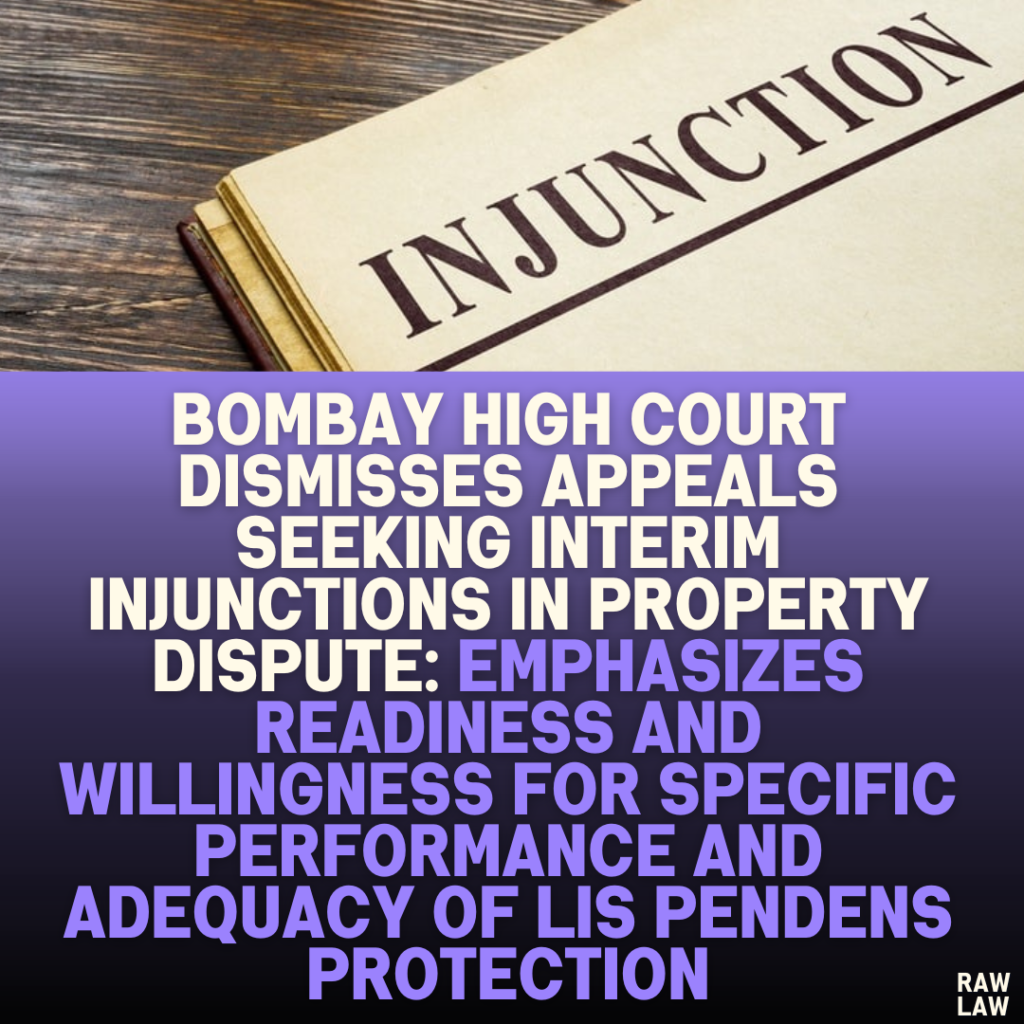Court’s Decision
The Bombay High Court dismissed the appeals filed by the appellants, who sought interim injunctions to restrain the respondents from creating third-party interests over the disputed properties. The court upheld the trial court’s findings, ruling that the appellants had not demonstrated readiness and willingness to fulfill their contractual obligations. It concluded that no interference was warranted in the trial court’s discretion to deny interim relief.
Facts
- Nature of Dispute: The case revolved around agreements to sell (Visar Pavatis) executed in 2012, concerning portions of land in Gut No. 140 in Baramati, Pune. These agreements formed the basis of the appellants’ claim for specific performance.
- Properties and Agreements:
- Appeal from Order 1057 of 2023 related to portions (17 R and 18 R) owned by the Malgunde family.
- Appeal from Order 99 of 2024 involved similar portions of land in the same Gut number.
- Legal Background: The appellants alleged that the respondents executed third-party sale deeds and gift deeds despite the existing agreements. They sought specific performance, declarations that subsequent transactions were invalid, and injunctions against creating further third-party rights.
- Respondents’ Actions: After issuing notices in 2019 and alleging non-payment, the respondents canceled the agreements and executed sale deeds in favor of third parties.
Issues
- Did the appellants demonstrate readiness and willingness to perform their obligations under the agreements?
- Was the trial court correct in denying interim relief?
- Was the doctrine of lis pendens sufficient to protect the appellants’ rights?
Petitioner’s Arguments
- Substantial Payment Made: The appellants argued they paid considerable sums under the Visar Pavatis and were ready and willing to fulfill their obligations.
- Impact of Injunction: The appellants attributed delays to an injunction obtained by a third party, which purportedly affected the properties.
- Irreparable Harm: They claimed that the absence of an injunction would lead to irreparable harm as the properties were sold to third parties.
- Reliance on Case Laws: The appellants cited several precedents on the necessity of interim injunctions, the doctrine of lis pendens, and the legal principles governing specific performance.
Respondent’s Arguments
- Non-performance by Appellants: The respondents contended that the appellants failed to perform their obligations despite repeated notices in 2019. Final notices were issued, and the agreements were canceled due to non-payment.
- Delays by Appellants: The respondents argued that the appellants waited until 2021 to file suits, long after the agreements were terminated and subsequent sales were executed.
- Counter-claims: They filed counter-claims for damages, asserting that the appellants’ non-performance caused them financial loss and missed investment opportunities.
- Doctrine of Lis Pendens: They argued that the doctrine adequately protected the appellants’ interests without requiring an injunction.
Analysis of the Law
- Readiness and Willingness: The court emphasized the importance of demonstrating consistent readiness and willingness under Section 16 of the Specific Relief Act, 1963. The appellants failed to show any overt actions to complete the transactions or mitigate delays.
- Lis Pendens: Section 52 of the Transfer of Property Act, 1882, protects the rights of litigants during pending disputes. The court noted that this doctrine sufficiently safeguarded the appellants’ interests.
- Grant of Injunctions: The court reiterated that granting injunctions is discretionary and depends on the balance of convenience, irreparable harm, and prima facie case.
Precedent Analysis
- Appellants’ Reliance:
- Judgments on lis pendens and the necessity of injunctions were acknowledged but found irrelevant due to the appellants’ failure to prove readiness and willingness.
- Cases like K. Ravi Prasad Reddy and Jagan Singh were distinguished, as the facts in the present case did not align with those precedents.
- Respondents’ Reliance:
- The court endorsed principles from Wander Ltd. vs. Antox India P. Ltd., limiting appellate interference with trial court discretion unless decisions are arbitrary or capricious.
Court’s Reasoning
- Appellants’ Conduct:
- The court observed that despite entering into agreements in 2012, the appellants failed to make timely payments or take proactive steps to complete the transactions.
- The appellants’ claim of being thwarted by a third-party injunction was found unconvincing, as the injunction only partially affected the property.
- No clarifications or legal actions were initiated by the appellants to resolve ambiguities in the injunction.
- Belated Suits:
- Filing suits in 2021, nearly a decade after the agreements and long after the respondents’ cancellation, indicated a lack of urgency or willingness.
- Trial Court’s Findings:
- The trial court correctly noted that the appellants lacked prima facie evidence of readiness and willingness.
- It highlighted the appellants’ failure to demonstrate financial capacity or intent to complete the transactions.
Conclusion
The High Court dismissed the appeals, holding that:
- The trial court’s decision was neither arbitrary nor capricious.
- The doctrine of lis pendens provided adequate protection, and interim relief was unnecessary.
- The appellants failed to demonstrate readiness and willingness, undermining their case for specific performance.
Implications
This judgment underscores:
- The significance of demonstrating consistent readiness and willingness in specific performance cases.
- The doctrine of lis pendens as a safeguard during property disputes.
- The limited scope for appellate interference in trial court decisions on discretionary matters like injunctions.
By refusing interim relief, the court clarified that specific performance cannot be granted without substantial proof of timely and proactive compliance with contractual obligations.
